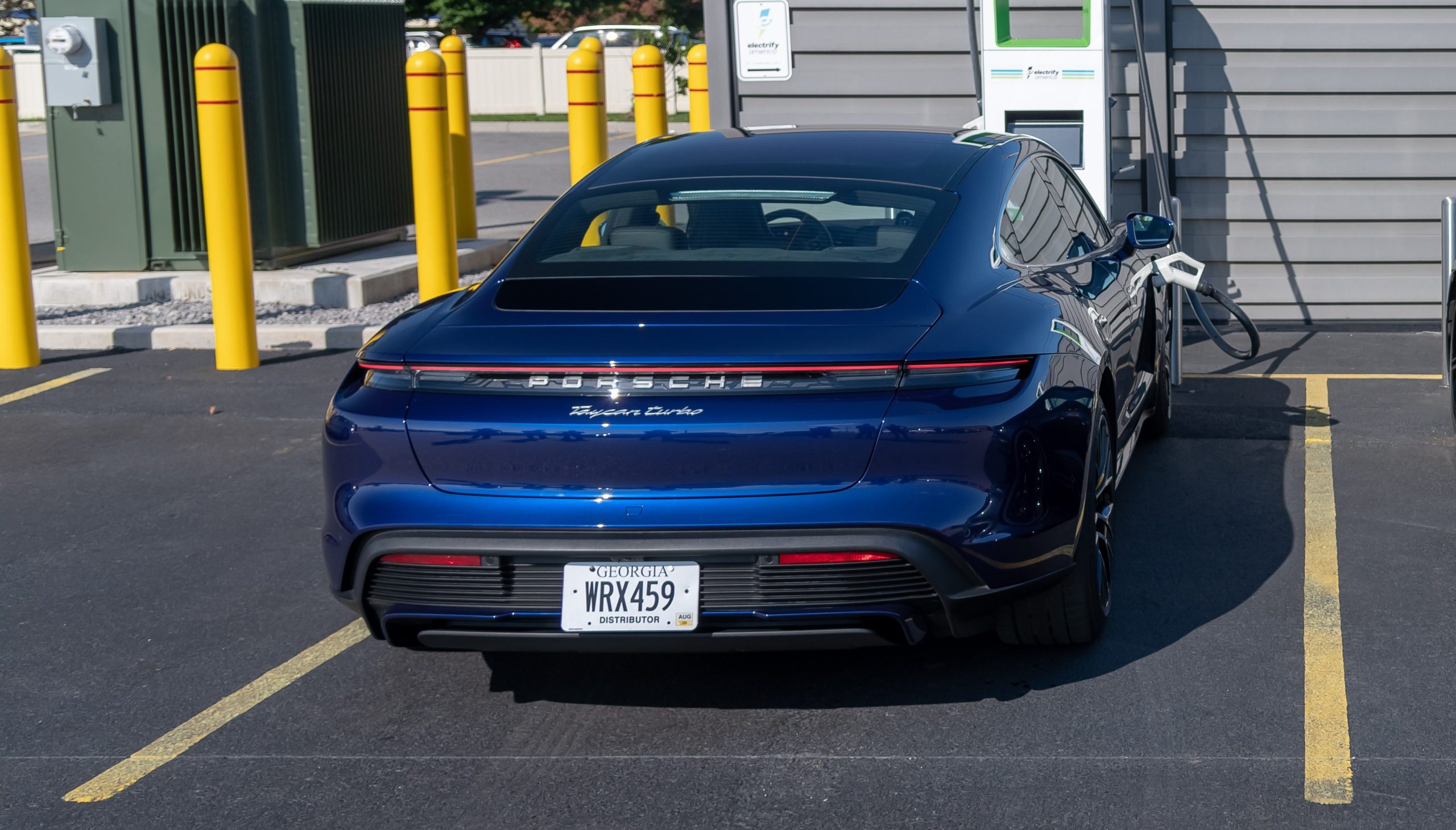
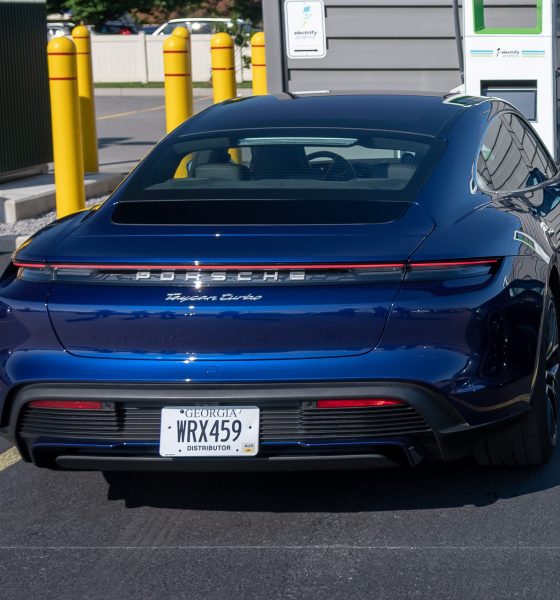
News
Porsche Taycan becomes first to charge at 270 kW on Electrify America’s Ultra-Fast DC Chargers
On the day of the Porsche Taycan’s unveiling, the all-electric sports car from Zuffenhausen traveled from Niagara Falls to Bloomsburg, Pennsylvania after a record-setting charging session. This was made possible with not only the Taycan’s 800-volt architecture, but also Electrify America’s (EA) ultra-fast 270 kW DC Charger, currently the fastest rate in the industry.
The Porsche Taycan utilized Electrify America’s high-powered charger to replenish its 93 kWh battery from 5% to 80% in 22.5 minutes. The 250-mile journey from the U.S.-Canadian border to Bloomsburg, PA provides an optimistic teaser of the rapidly-growing high-powered charging infrastructure in the United States, outside of Tesla’s better-known global network of Superchargers.
“When Electrify America was formed, the idea of ultra-fast public charging was still very theoretical, and no 350 kW chargers were available to electric vehicle drivers. Today we are proud to showcase our network’s diligent engineering capability through successful, real-world 270 kW DC fast charging examples, finally making ultra-fast public charging a true reality,” notes Giovanni Palazzo, Chief Executive Officer of Electrify, in a press release.
The Taycan was initially announced by Porsche to be compatible with Electrify America’s maximum output of 350 kW, though the German carmaker opted to adjust this rate to 270 kW, citing current battery cell chemistry can not safely support higher power levels. Nevertheless, even at 270 kW, the Porsche Taycan and Electrify America’s ultra-fast DC chargers still represent the fastest EV charging rate available in the market today.
The volume of chargers has seen a drastic rise in both technological improvement and mass expansion across the world due to the increasing demand for electric cars throughout the world. Electrify America’s latest ultra-fast chargers is in response to the growing demand for time-efficient chargers that will allow more people to recharge their vehicles in a shorter period of time.
Tesla, for its part, currently utilizes a network of 150 kWh Superchargers V2 stations, though the company has begun rolling out a network of 250 kWh V3 Superchargers. Tesla’s new, more powerful V3 Superchargers, along with Electrify America’s new, high-powered EV chargers usher in a new era of super-fast EV charging. With faster charge times, EV owners across the board will spend less time at charging stations during long trips, and more time behind the wheel, decreasing overall trip time. According to Tesla’s March 2019 press release regarding the new, high-powered superchargers will allow peak rates of 250 kWh per car, giving owners of the Long Range Model 3 75 miles of charge in only 5 minutes.

Elon Musk
Tesla AI5 chip nears completion, Elon Musk teases 9-month development cadence
The Tesla CEO shared his recent insights in a post on social media platform X.
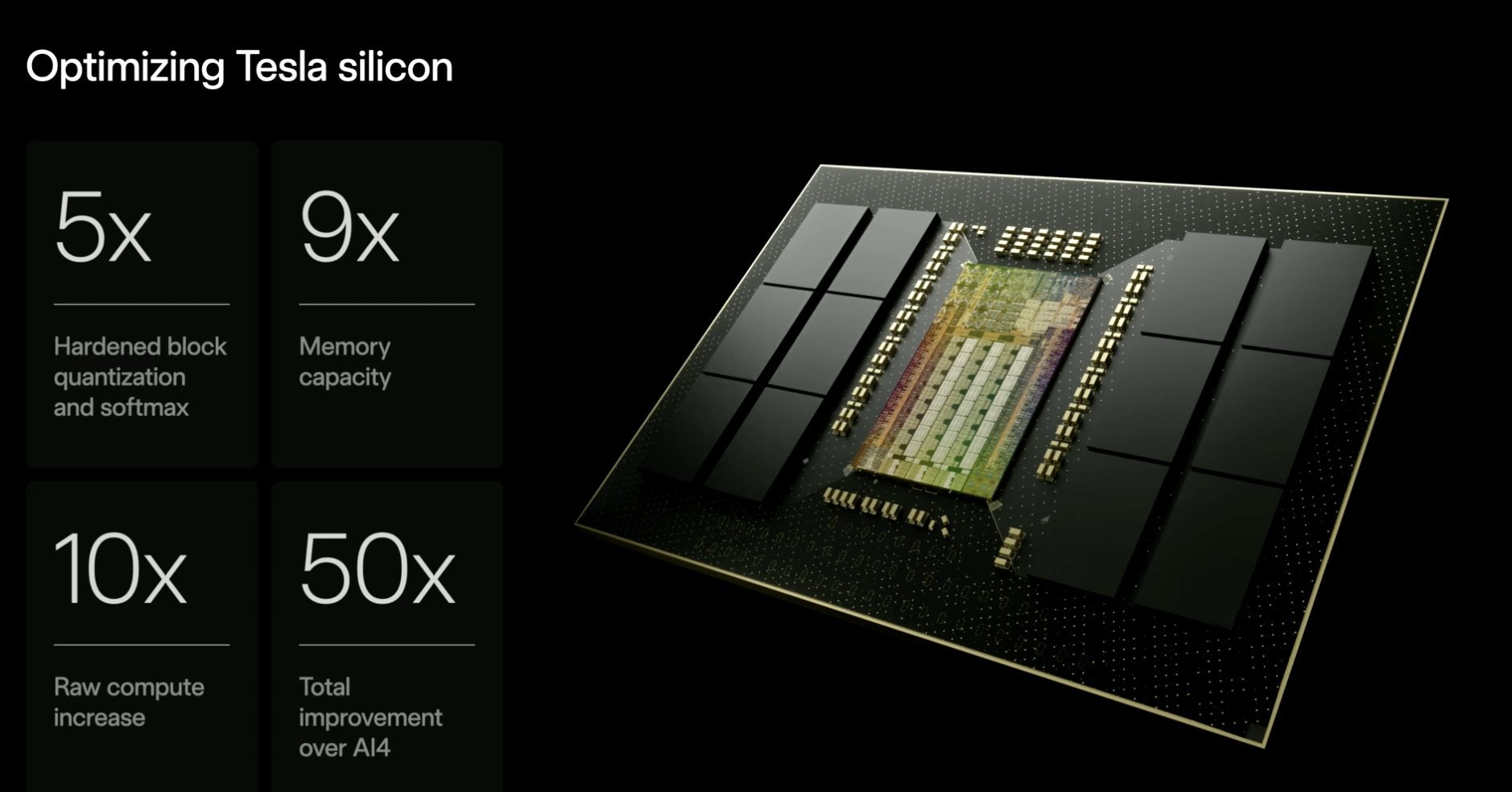
Tesla’s next-generation AI5 chip is nearly complete, and work on its successor is already underway, as per a recent update from Elon Musk.
The Tesla CEO shared his recent insights in a post on social media platform X.
Musk details AI chip roadmap
In his post, Elon Musk stated that Tesla’s AI5 chip design is “almost done,” while AI6 has already entered early development. Musk added that Tesla plans to continue iterating rapidly, with AI7, AI8, AI9, and future generations targeting a nine-month design cycle.
He also noted that Tesla’s in-house chips could become the highest-volume AI processors in the world. Musk framed his update as a recruiting message, encouraging engineers to join Tesla’s AI and chip development teams.
Tesla community member Herbert Ong highlighted the strategic importance of the timeline, noting that faster chip cycles enable quicker learning, faster iteration, and a compounding advantage in AI and autonomy that becomes increasingly difficult for competitors to close.
AI5 manufacturing takes shape
Musk’s comments align with earlier reporting on AI5’s production plans. In December, it was reported that Samsung is preparing to manufacture Tesla’s AI5 chip, accelerating hiring for experienced engineers to support U.S. production and address complex foundry challenges.
Samsung is one of two suppliers selected for AI5, alongside TSMC. The companies are expected to produce different versions of the AI5 chip, with TSMC reportedly using a 3nm process and Samsung using a 2nm process.
Musk has previously stated that while different foundries translate chip designs into physical silicon in different ways, the goal is for both versions of the Tesla AI5 chip to operate identically. AI5 will succeed Tesla’s current AI4 hardware, formerly known as Hardware 4, and is expected to support the company’s Full Self-Driving system as well as other AI-driven efforts, including Optimus.
News
Tesla Model Y and Model 3 named safest vehicles tested by ANCAP in 2025
According to ANCAP in a press release, the Tesla Model Y achieved the highest overall weighted score of any vehicle assessed in 2025.
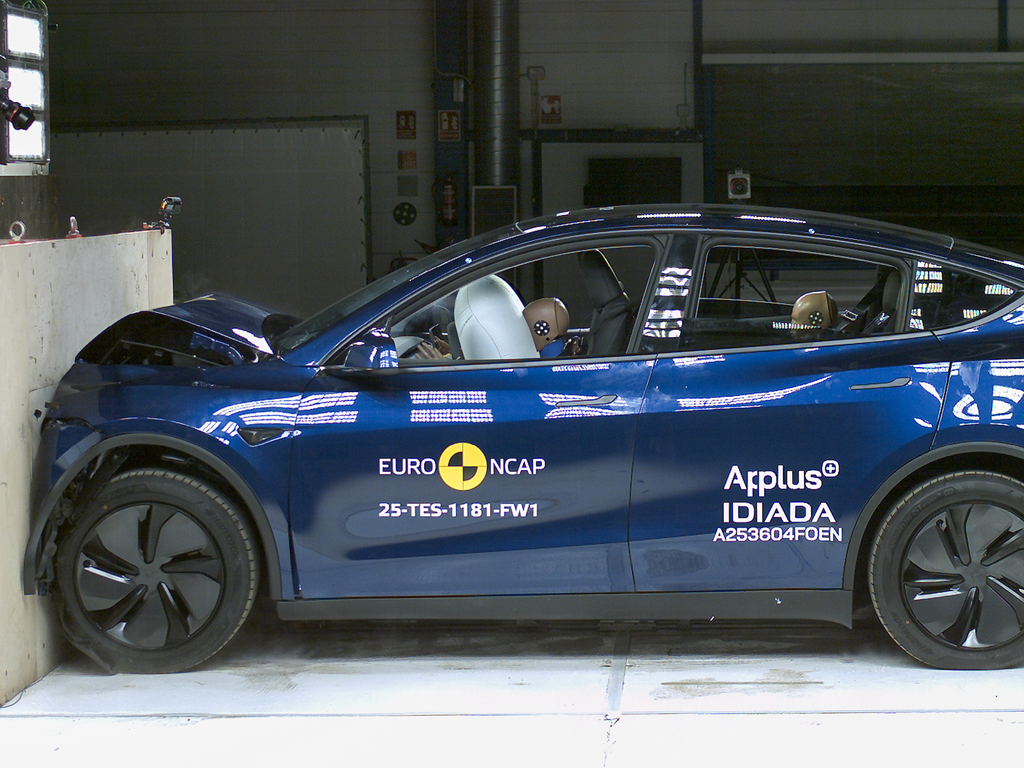
The Tesla Model Y recorded the highest overall safety score of any vehicle tested by ANCAP in 2025. The Tesla Model 3 also delivered strong results, reinforcing the automaker’s safety leadership in Australia and New Zealand.
According to ANCAP in a press release, the Tesla Model Y achieved the highest overall weighted score of any vehicle assessed in 2025. ANCAP’s 2025 tests evaluated vehicles across four key pillars: Adult Occupant Protection, Child Occupant Protection, Vulnerable Road User Protection, and Safety Assist technologies.
The Model Y posted consistently strong results in all four categories, distinguishing itself through a system-based safety approach that combines structural crash protection with advanced driver-assistance features such as autonomous emergency braking, lane support, and driver monitoring.
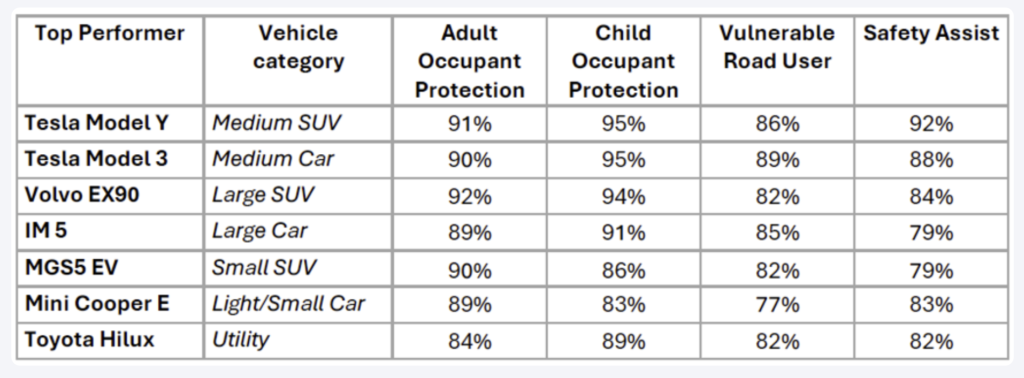
This marked the second time the Model Y has topped ANCAP’s annual safety rankings. The Model Y’s previous version was also ANCAP’s top performer in 2022.
The Tesla Model 3 also delivered a strong performance in ANCAP’s 2025 tests, contributing to Tesla’s broader safety presence across segments. Similar to the Model Y, the Model 3 also earned impressive scores across the ANCAP’s four pillars. This made the vehicle the top performer in the Medium Car category.
ANCAP Chief Executive Officer Carla Hoorweg stated that the results highlight a growing industry shift toward integrated safety design, with improvements in technologies such as autonomous emergency braking and lane support translating into meaningful real-world protection.
“ANCAP’s testing continues to reinforce a clear message: the safest vehicles are those designed with safety as a system, not a checklist. The top performers this year delivered consistent results across physical crash protection, crash avoidance and vulnerable road user safety, rather than relying on strength in a single area.
“We are also seeing increasing alignment between ANCAP’s test requirements and the safety technologies that genuinely matter on Australian and New Zealand roads. Improvements in autonomous emergency braking, lane support, and driver monitoring systems are translating into more robust protection,” Hoorweg said.
News
Tesla Sweden uses Megapack battery to bypass unions’ Supercharger blockade
Just before Christmas, Tesla went live with a new charging station in Arlandastad, outside Stockholm, by powering it with a Tesla Megapack battery.
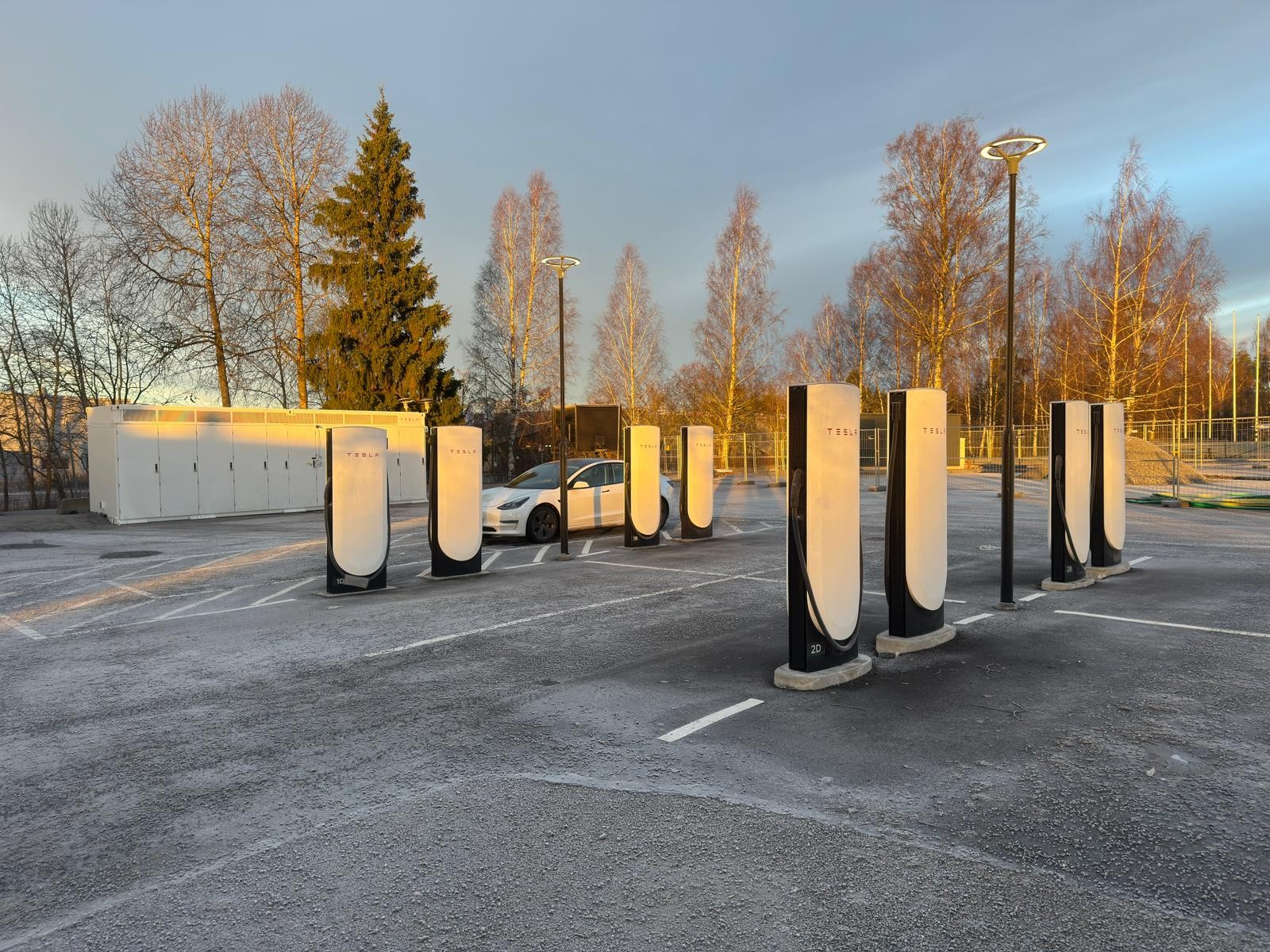
Tesla Sweden has successfully launched a new Supercharger station despite an ongoing blockade by Swedish unions, using on-site Megapack batteries instead of traditional grid connections. The workaround has allowed the Supercharger to operate without direct access to Sweden’s electricity network, which has been effectively frozen by labor action.
Tesla has experienced notable challenges connecting its new charging stations to Sweden’s power grid due to industrial action led by Seko, a major Swedish trade union, which has blocked all new electrical connections for new Superchargers. On paper, this made the opening of new Supercharger sites almost impossible.
Despite the blockade, Tesla has continued to bring stations online. In Malmö and Södertälje, new Supercharger locations opened after grid operators E.ON and Telge Nät activated the sites. The operators later stated that the connections had been made in error.
More recently, however, Tesla adopted a different strategy altogether. Just before Christmas, Tesla went live with a new charging station in Arlandastad, outside Stockholm, by powering it with a Tesla Megapack battery, as noted in a Dagens Arbete (DA) report.
Because the Supercharger station does not rely on a permanent grid connection, Tesla was able to bypass the blocked application process, as noted by Swedish car journalist and YouTuber Peter Esse. He noted that the Arlandastad Supercharger is likely dependent on nearby companies to recharge the batteries, likely through private arrangements.
Eight new charging stalls have been launched in the Arlandastad site so far, which is a fraction of the originally planned 40 chargers for the location. Still, the fact that Tesla Sweden was able to work around the unions’ efforts once more is impressive, especially since Superchargers are used even by non-Tesla EVs.
Esse noted that Tesla’s Megapack workaround is not as easily replicated in other locations. Arlandastad is unique because neighboring operators already have access to grid power, making it possible for Tesla to source electricity indirectly. Still, Esse noted that the unions’ blockades have not affected sales as much.
“Many want Tesla to lose sales due to the union blockades. But you have to remember that sales are falling from 2024, when Tesla sold a record number of cars in Sweden. That year, the unions also had blockades against Tesla. So for Tesla as a charging operator, it is devastating. But for Tesla as a car company, it does not matter in terms of sales volumes. People charge their cars where there is an opportunity, usually at home,” Esse noted.








